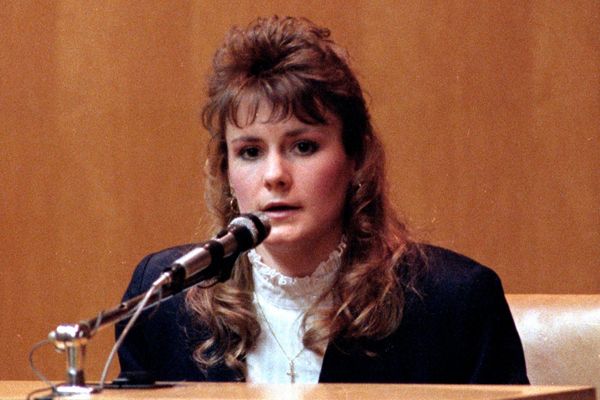
The landmark Ben Roberts-Smith defamation judgment that will be handed down on Thursday is not only a high stakes battle between award-winning journalists and Australia’s most decorated soldier but also between two of Australia’s largest media companies.
Justice Anthony Besanko will deliver a verdict in Sydney on 1 June that is the culmination of a near five-year legal process and which is said to have cost the two sides close to $35m in legal fees alone.
In one corner is Nine Entertainment and its multi-award-winning investigative reporter Nick McKenzie and journalist and author Chris Masters. In the other is the billionaire chairman of Seven West Media (SWM) Kerry Stokes who is bankrolling the legal fees for litigant Ben Roberts-Smith.
Masters is the author of the 2017 book No Front Line: Australia’s Special Forces at War in Afghanistan.
The former ABC reporter teamed up with McKenzie and wrote a number of exclusives in 2018 for the former Fairfax papers the Sydney Morning Herald, the Age and the Canberra Times which detailed allegations of war crimes in Afghanistan committed by Australian special forces.
The former soldier sued the mastheads in August 2018 for six articles alleging Masters’ and McKenzie’s reporting defamed him, wrongly portraying him as a war criminal and murderer who “broke the moral and legal rules of military engagement”.
Roberts-Smith has strenuously denied all of the allegations, describing them as “completely without any foundation in truth”. The newspapers defended their reporting as true.
The case has caused considerable animosity between Seven and Nine, traditionally rivals in the commercial television game only.
During the trial, counsel for Roberts-Smith said the stories were a “scurrilous campaign by a media rival”, and Roberts-Smith was being “subjected to this attack because of his employment by Seven West Media”.
Alongside News Corp Australia, Nine and SWM own the bulk of Australia’s media between them, including the Seven network and the West Australian newspaper on Stokes’ side and the SMH and the Age, which have invested heavily in investigative journalism on Nine’s side.
During the trial, one of the SAS witnesses for Roberts-Smith revealed Seven was paying his legal fees, contradicting Seven’s claim that the former soldier’s evidence about the source of the payments was “not correct”.
A spokesperson later clarified the fees were being “reimbursed” by another arm of the Stokes empire.
“The fees were reimbursed by ACE [Australian Capital Equity], the chair’s private company,” the spokesperson said. “The chairman felt it was unfair that soldiers were being brought before the inquiry without representation.”
The court heard that the request for reimbursement was not made to Stokes’s private company until after Seven’s legal financing was revealed in court.
Stokes appointed Roberts-Smith as general manager of Seven Queensland in 2015 but the ex-soldier stood aside in 2021 to focus on the trial. The network’s commercial director, Bruce McWilliam, has attended court and given evidence.
It was McWilliam who commissioned journalist Ross Coulthart to investigate allegations of war crimes committed by Roberts-Smith, the federal court heard in 2021.
The outcome of the case will not just affect Nine and Seven but could have a chilling effect on investigative journalism, media academics say.
Andrea Carson, a professor of political communication at La Trobe University, said investigative journalism was an expensive undertaking in terms of time and resources but organisations that undertook it got “a return of credibility if it’s evidence based and it’s done well”.
“Australia’s defamation laws are some of the more onerous in developed democracies,” she told Guardian Australia.
“The newsrooms and editors and lawyers would have been wringing their hands about whether they’re going to take this [investigation] on or not even at the outset, and they’ve made that decision to do so because they obviously think it’s an important story in the public interest.
“After making those calculations, if they do lose this case, it could have a flow-on effect.”
Associate Prof Tim Dwyer of the University of Sydney’s media faculty said a verdict in Roberts-Smith’s favour would contribute to the perception that defamation law rivals national security legislation in limiting public interest journalism
“It’s akin to when Reporters Without Borders marked Australia down in their 2020 report for the AFP raids on ABC journalists’ sources in relation to reporting these war crime events in Afghanistan,” Dwyer told Guardian Australia.
“This case will have a chilling effect on investigative journalism on all media organisations who pursue these kinds of very consequential public interest stories.
“Although major media organisations have substantial defamation budgets the estimated costs and damages in this kind of long-running defamation case will inevitably bring a more cautious approach.”
Guardian Australia will publish a special episode of the podcast Ben Roberts-Smith v the media on Friday morning. Subscribe to Ben Roberts-Smith v the media to catch up on the court case and be notified of new episodes







